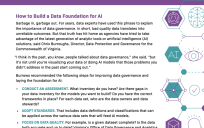Data privacy and governance remain top priorities for government agencies as they navigate the growing concerns surrounding data security in the digital age. With the exponential rise in data collection and usage, public trust is directly tied to how well government entities handle sensitive information, particularly personally identifiable information (PII). For federal leaders, building a culture of transparency, compliance, and ethical data use is essential to establishing and maintaining citizen trust.

Technological Advances in Data Protection
Recent technological advancements provide government agencies with the tools to build robust data privacy frameworks. For example, AI and machine learning algorithms can now detect unusual data patterns, allowing for early detection of potential data breaches. Agencies are also increasingly implementing zero-trust architectures, a security model where every access request is verified and validated to prevent unauthorized access. This approach minimizes the risk of data breaches by ensuring that access to sensitive information is continuously monitored and restricted to essential personnel only.
Another critical tool for government agencies is blockchain, which offers a decentralized way of managing data and can enhance transparency in data governance. Blockchain’s tamper-resistant nature can help track the integrity of data transactions, enabling leaders to quickly identify unauthorized changes to sensitive information.
Key Data Privacy and Compliance Frameworks
To manage data privacy risks effectively, government leaders should adopt standardized frameworks such as the National Institute of Standards and Technology (NIST) Privacy Framework, which provides a comprehensive guide for integrating data privacy and protection into organizational practices. The NIST Privacy Framework is widely recognized for helping organizations manage data risks and align with other privacy laws, such as the European Union’s General Data Protection Regulation (GDPR) and the California Consumer Privacy Act (CCPA). These frameworks encourage leaders to identify the types of data collected, assess potential risks, and implement structured controls to protect privacy.
Additionally, the Federal Risk and Authorization Management Program (FedRAMP) provides standardized security requirements for federal cloud computing services, ensuring that data managed through cloud services meets strict compliance and security standards.
Cultivating Transparency and Accountability
Government agencies must prioritize transparency and ethical data usage to build public trust. Publicly accessible data privacy policies that outline collection, usage, and sharing practices provide citizens with assurance that their data is being managed responsibly. Furthermore, agencies can implement internal accountability measures by establishing data governance committees and regular data audits. Leaders should consider adopting the “privacy by design” approach, which integrates data protection into technology solutions from the outset rather than as an afterthought.
Creating a culture of accountability also extends to agency personnel. Through regular training on data privacy practices, government employees can better understand the ethical implications of data management and the role they play in maintaining public trust.
Strategic Steps for Leaders to Enhance Data Privacy
- Routine Policy Audits: Leaders should regularly audit data privacy policies to ensure alignment with evolving regulations and best practices.
- Access Control Mechanisms: Role-based access controls can limit exposure to sensitive information, minimizing potential risks.
- Adapt to Emerging Regulations: Compliance with GDPR, CCPA, and similar regulations is critical. Staying informed and updating policies accordingly demonstrates a commitment to data privacy.
Embracing a Culture of Continuous Improvement
Agencies that prioritize continuous improvement in data privacy practices will be better positioned to build a trustworthy framework for responsible data management. Regularly incorporating advanced technologies, strengthening data governance structures, and training employees fosters a data privacy culture that aligns with public expectations of ethical data use.
Conclusion
For federal leaders, fostering a future-ready workforce in data privacy is a strategic move that supports mission objectives and protects citizens’ data. Leaders who prioritize these practices can set their agencies apart as examples of secure, trusted governance in the digital age.
Dr. Rhonda Farrell is a transformation advisor with decades of experience driving impactful change and strategic growth for DoD, IC, Joint, and commercial agencies and organizations. She has a robust background in digital transformation, organizational development, and process improvement, offering a unique perspective that combines technical expertise with a deep understanding of business dynamics. As a strategy and innovation leader, she aligns with CIO, CTO, CDO, CISO, and Chief of Staff initiatives to identify strategic gaps, realign missions, and re-engineer organizations. Based in Baltimore and a proud US Marine Corps veteran, she brings a disciplined, resilient, and mission-focused approach to her work, enabling organizations to pivot and innovate successfully.





Leave a Reply
You must be logged in to post a comment.